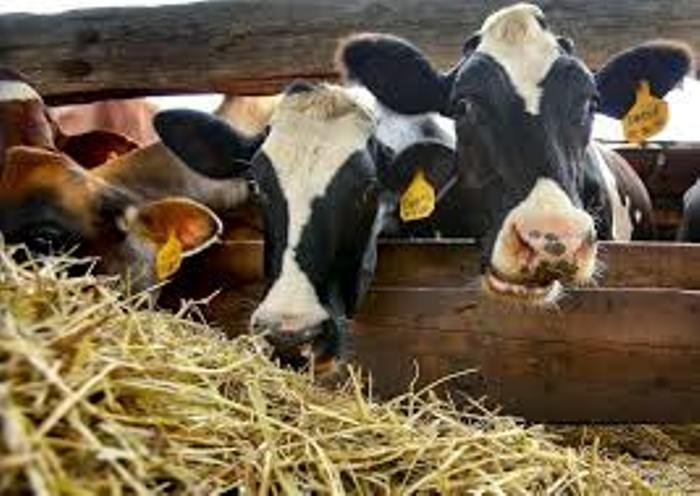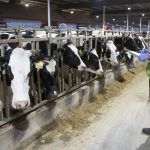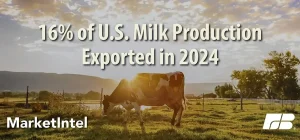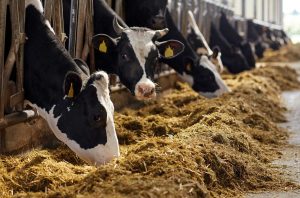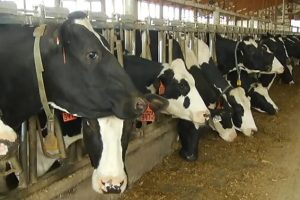
Kathy Hildebrand, co-owner of the Junction City dairy farm, said the farm received neither of the payments made through the Market Facilitation Program. That federal program provides support to farmers to make up for dollars lost because of trade wars.
Hildebrand’s voice was cheerful despite the pressures on the business, and she said they had made plans to handle things without the checks.
“We just keep plugging along,” she said. “It will be nice when we get it, so we can pay some extra money on the other bills that we have.”
She said they have reached out to their lenders and assured them that “we’ll get you paid.”
“We’re doing OK,” she said. “It hasn’t, as of yet, directly affected us.”
But it all depends on how long Hildebrand farm vendors are willing to be patient. Those vendors need their money to pay their creditors too, she said.
Jackie Klippenstine, a senior vice president for Dairy Farmers of America, said many dairy farmers have been challenged because the second round of their payments through the MFP were held up.
Late last year, the federal government announced there would be support payments to help farmers make up for the losses they were experiencing as a result of the trade war. Dairy farmers were slated to receive $0.12 cwt, a hundredweight measurement used in commodities trading, based on their 2018 production. While many farmers received the first half of the payments, the shutdown held up the second half of payments — although with the U.S. Department of Agriculture closed, it is difficult to determine how many checks didn’t go out.
“I can’t speak to the other segments that are impacted, but the dairy industry has been going through several very challenging years,” Klippenstein said. “That would have been much appreciated relief to the farmers that were the most affected. Those funds will not be dispersed until the government reopens. That’s one of the most immediate challenges that I can see.”
Klippenstein said the USDA indicated about $40 million was left on the table from the first round of dairy payments.
“We know there are some farmers out there that likely don’t think they’re eligible,” she said. “There’s probably a small group of farmers who are not interested in getting it at all. Nobody wants the idea of getting these types of payments, but I think it was timed well to help producers with some of the bills they had to pay end of year.”
In addition to delayed tariff-support payments, the U.S. Department of agriculture is “basically shut down,” which creates challenges for processing loans, grants and other information, she said.
In talking with officials from other states about the shutdown challenges, Klippenstein said she believes many may be unaware how the entire chain is impacted when it comes to food production.
“We don’t realize how much government interaction that the industry has on a regular basis,” she said. “We apparently secure permits for some of our trucking fleets, and the IRS and the department of transportation are both involved in securing those permits. If those entities aren’t open, we have difficulty securing the permits. We have difficulty moving milk.”
Not as imperative as missed MFP payments is the fact that the dairy industry received support in the recently passed farm bill, particularly in how the margin protection program was changed to be more flexible, affordable and accessible, Klippenstein said.
“Now rolling out the new program will be delayed with USDA being shut down like most of the government,” she said.
One benefit of the shutdown, though, is that Dairy Farmers of America has been able to speak to lawmakers on the local level, Klippenstein said.
“While several have been in Washington doing some work, especially the House because they had some votes over the last two weeks or so, we have seen legislators home more,” she said. “Farmers are able to directly speak with them. Most legislators are seeking meetings with stakeholders to better understand how this shutdown is impacting them. I think that’s a very positive sign. Our farmers are very politically active and always willing to share how the industry is being impacted by good ideas or bad ideas that they see the government putting forth.”
Hildebrand holds out hope that those in Washington, D.C., will find a solution to reopen the government.
“It’s frustrating that they can’t get along and figure things out,” she said.
